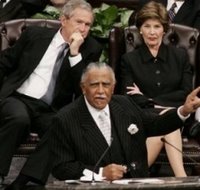What follows is part of an exchange in the comments section of the previous post.
I'm moving it up from there to this place so that it might offer a way to think about who we are, why we are, and what our responsibilities to God's creation are.
Here's a comment from a good man, husband and father who is seeking to live his life with faith and conviction -
So, is Cone telling me that, through no choice or fault of my own, I am racist because I was raised by white parents and taught by white church leaders? If that is the case, it seems that the cycle of racism will never be broken. Is Cone telling me that because I am white, the children I raise will be racist, no matter what I teach them? How does Cone suggest we deal with racism?
My response -
This is a conversation best suited with a couple of good ales and Miles Davis in the background (preferably with Coltrane).
Your response was just like mine the first time I encountered Cone.
Cone has several interpreters that range from a theology of liberation that reverses the role of white and black folks in culture to a transcendent view of the world in which parties in power acknowledge the propensity to advantage by nothing more arbitrary than their birth (what color they are, where they live, etc.), and then choose not to exploit that advantage for self - rather, make it an instrument through which mutuality in the church, society, the world can emerge.
But Cone is right, I think, to say that as one of the advantaged, by definition, I can't be the one to offer the "fix"to the problem. Otherwise I'm still in power. Rather, by hearing from the "other," and he would say, "oppressed," I voluntarily suspend my power position for the sake of the greater good that is beyond me.
I can live with that - in fact, I find distinct Biblical parallels and directives.
One of my favorite non Gospel New Testament readings is Philippians 2.
It's known as "The Hymn to Christ."
"If then there is any encouragement in Christ, any consolation from love, any sharing in the Spirit, any compassion and sympathy, make my joy complete: be of the same mind, having the same love, being in full accord and of one mind. Do nothing from selfish ambition or conceit, but in humility regard others as better than yourselves. Let each of you look not to your own interests, but to the interests of others. Let the same mind be in you that was in Christ Jesus, who, though he was in the form of God, did not regard equality with God as something to be exploited, but emptied himself,taking the form of a slave, being born in human likeness. And being found in human form, he humbled himself and became obedient to the point of death, even death on a cross."
One of the key elements of what I was writing about, though, is to acknowledge with honesty that the self-protective tendency in me would use my status and place to maintain an advantage if pushed into a corner. I believe that understanding that about those of us who are advantaged is the first step to not doing it.
Folks who declare they aren't racist, and can't admit their capacity to be, are on thin ice, I fear.
A Further Reflection
But if I approach my life,
and every relationship I have,
and every one of the "isms" and "phobias" that pervade the world in which I live
and the inner parts of my being with pursuit of the mind of Christ,
I'm on a path that transcends my "bent toward sinning," and moves me into a fuller vision of God's beautiful creation in all its diversity.
Of the Hymn to Christ, there is an interpretation that intrigues me.
In particular, the "though" (which I highlighted).
We typically think of that word as something that could mean "although," almost as an aside to what everyone should know already.
But one commentator suggests that the "though" more accurately means "precisely because." That is, Jesus, "precisely because" he was in the form of God, didn't count the power of that reality to be exploited for the sake of self-advantage.
All of which declares the nature of God, of Jesus, and those of us who fancy ourselves Jesus' companions (I'm indebted to John Dominic Crossan for the distinction between disciples and companions).
If I'm seeking the mind of Christ, then, precisely because of who Jesus is, I will yield any advantage in every relationship for the good of the "other."
There are no boundaries that I can use to segregate, discriminate, or exclude.
So maybe what we teach our kids is the truth about what they are going to encounter as they grow up in this society and, by our example, show that any advantage you have over someone else by virtue of their race, orientation, gender - must be surrendered as an act of faith.
It seems to me that Martin's dream needs to have the last word here:
I have a dream that my four little children will one day live in a nation where they will not be judged by the color of their skin but by the content of their character...
And when this happens, when we allow freedom ring, when we let it ring from every village and every hamlet, from every state and every city, we will be able to speed up that day when all of God's children, black men and white men, Jews and Gentiles, Protestants and Catholics, will be able to join hands and sing in the words of the old Negro spiritual:
Free at last! Free at last!
Thank God Almighty, we are free at last!


